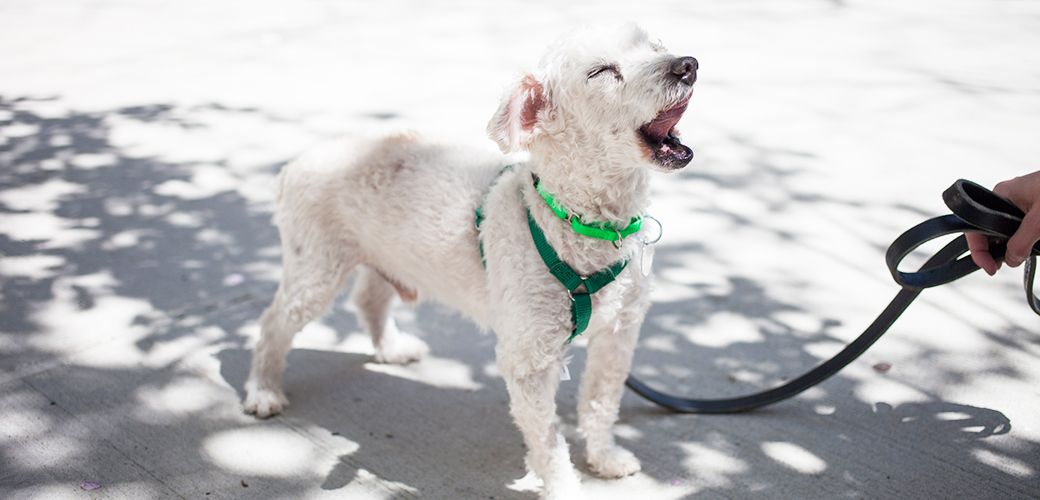To stop a dog from barking at other dogs, get their attention by calling their name throughout the day, avoid places with many dogs, distract them when meeting other dogs, practice frequently, give them play opportunities, use a long leash, and avoid pulling on it. Excessive barking at other dogs can be a common behavior issue for many pet owners.
It may be caused by a variety of reasons, such as excitement, fear, territorial behavior, or a lack of socialization. Dogs may also bark to communicate and establish boundaries. However, this behavior can be problematic and may disrupt the peace and quiet of your neighborhood.
Fortunately, there are effective techniques you can use to train your dog to stop barking at other dogs. By implementing these strategies and being consistent with training, you can successfully address this behavior and help your dog become more calm and relaxed around other dogs. We will explore some useful methods to stop your dog from barking at other dogs and promote a harmonious relationship.
:strip_icc()/puppy-barking-2804577-f7f6bffd80fa4edca1bd247ba52fc0a6.jpg)
Credit: www.thesprucepets.com
Understanding The Reasons For Barking
When your dog barks at other dogs, it can be frustrating and worrisome. To effectively address this behavior, it’s important to understand the reasons behind it. Dogs may bark at other dogs due to excitement, fear, territorial behavior, or a lack of socialization. Additionally, barking can serve as a way for dogs to communicate and establish boundaries. By identifying the underlying cause of your dog’s barking, you can tailor your training approach to address it effectively.
Excitement, Fear, And Territorial Behavior
One common reason why dogs bark at other dogs is due to excitement. Some dogs become overly enthusiastic and may bark when they see other dogs, especially if they haven’t been well-socialized. This excitement can sometimes escalate to fear, causing your dog to bark as a form of defense mechanism.
Territorial behavior is another reason for barking at other dogs. Dogs naturally have a sense of territory, and when they perceive an intruder encroaching on their space, they may bark to protect what they consider as theirs.
Lack Of Socialization And Communication
Another factor that can contribute to your dog’s barking at other dogs is a lack of proper socialization and communication skills. If your dog hasn’t been exposed to a variety of dogs and situations from an early age, they may feel unsure or threatened when encountering other dogs. Barking becomes their way of expressing their discomfort or attempting to establish hierarchy.
It is crucial to expose your dog to different environments, people, and dogs while teaching them proper communication skills. This can help them feel more comfortable and confident during encounters with other dogs, reducing the likelihood of excessive barking.
Establishing Boundaries
Furthermore, dogs may bark at other dogs to establish boundaries. Dogs use barking as a way to communicate their intentions or desires. By barking, they may be indicating that they want the other dog to stay away or back off. This behavior can be more prevalent in dogs who have not been taught proper socialization and appropriate ways to interact with other dogs.
Training your dog to establish boundaries without excessive barking involves teaching them alternative behaviors such as sitting or staying calm when a dog approaches. Positive reinforcement and repetition are key in helping your dog understand what is expected of them and how to communicate effectively without resorting to barking.

Credit: medium.com
Techniques To Stop Dog From Barking At Other Dogs
Looking to stop your dog from barking at other dogs? Try techniques like getting your dog’s attention, avoiding places with many dogs, and practicing with distractions. Remember, consistency and positive reinforcement are key to successful training.
Desensitizing To Other Dogs
If your dog barks at other dogs due to excitement or fear, desensitizing them to the presence of other dogs can be effective. Start by exposing your dog to other dogs from a distance, gradually decreasing the distance as they become more comfortable. Reward your dog for calm behavior during these sessions, and gradually increase the exposure over time. This technique helps your dog learn that other dogs are not a threat and reduces their impulse to bark.
General Exposure
Getting your dog accustomed to being around other dogs in a controlled environment is key to stopping their barking. This can be done by taking your dog to places with fewer dogs initially and gradually increasing exposure. Provide positive experiences by rewarding calm behavior and redirecting their attention away from other dogs. Regular exposure to different dogs in different settings helps your dog learn to stay calm and focused.
Working With Distractions
Training your dog to focus on you despite distractions is crucial in reducing their barking at other dogs. Start by practicing commands and exercises in a low-distraction environment, gradually introducing distractions such as other dogs. Use positive reinforcement, such as treats or praise, to reward your dog for maintaining focus and ignoring other dogs. Consistent practice in different situations will help your dog become more focused and less reactive.
Heel And Leash Walking
Teaching your dog to walk calmly on a leash and maintain a heel position can significantly reduce their barking at other dogs. Start with basic leash training, rewarding your dog for walking calmly by your side. Gradually introduce other dogs during leash walks, providing rewards for maintaining a relaxed and controlled behavior. Practice heel walking in different environments to reinforce the behavior and reduce their reactivity.
Reward-based Training
Using rewards to reinforce good behavior is an effective strategy to stop your dog from barking at other dogs. Whenever your dog remains calm and quiet in the presence of other dogs, give them treats, praise, or playtime as positive reinforcement. This positive association helps your dog understand that remaining calm leads to rewards, encouraging them to choose calm behavior over barking.
Socialization With Other Dogs
Socializing your dog with other dogs in a controlled and positive environment is essential in reducing their barking. Start by arranging playdates with well-behaved dogs, ensuring proper introductions and supervision. Encourage positive interactions and redirect any signs of aggressive or reactive behavior. Gradually increase the duration and intensity of these play sessions to help your dog develop good social skills.
Tips For Managing Dogs’ Reactions To Other Dogs
To stop your dog from barking at other dogs, try avoiding approaching head-on, keeping your dog’s attention and rewarding them when the other dog is present. Consistent practice and positive reinforcement will help your dog associate other dogs with positive experiences.
Avoid Approaching Other Dogs Head-on
When walking your dog and you see another dog approaching, it’s important to avoid approaching them head-on. Dogs can become more reactive and aggressive when they feel threatened or cornered. Instead, try to create space by changing your direction or taking a wide berth around the other dog. This will help to prevent any potential confrontations and reduce the likelihood of your dog barking at the other dog.
Maintain Your Dog’s Attention And Reward
To prevent your dog from barking at other dogs, it’s crucial to maintain their attention and reward them for their good behavior. Use positive reinforcement techniques such as treats, praise, and play to redirect their focus away from the other dog and back to you. By consistently rewarding your dog for their calm behavior, they will learn to associate seeing another dog with positive experiences, reducing their reaction over time.
Use A Long Leash And Avoid Pulling
When walking your dog, using a long leash can give your dog more freedom to explore while still giving you control. This allows you to maintain a safe distance from other dogs and gives you time to assess their reaction. It’s important to avoid pulling on the leash when your dog starts to bark or show signs of stress. Instead, calmly redirect their attention and continue walking in a relaxed manner.
Recognize And Manage Your Dog’s Emotions
Understanding and managing your dog’s emotions is essential when it comes to preventing their barking at other dogs. Pay attention to cues such as body language, vocalizations, and panting to gauge how your dog is feeling. If you notice signs of fear or anxiety, it’s important to address these emotions through positive reinforcement, counter-conditioning, and desensitization techniques. Seek the help of a professional trainer if needed.
Take A Different Route
If you consistently encounter other dogs that trigger your dog’s barking, consider taking a different route during your walks. By avoiding areas with frequent dog encounters, you can help to minimize your dog’s reactivity. This allows you to gradually desensitize and expose your dog to other dogs at a pace that they can handle, making it easier to manage and train their behavior.
Train Your Dog To Pay Attention To You
To effectively manage your dog’s reactions to other dogs, it’s crucial to train them to pay attention to you. Practice basic obedience commands such as “sit” and “stay” in controlled environments and gradually introduce distractions like other dogs. Reward your dog for responding to your commands and redirect their attention away from the other dog. With consistent training and practice, your dog will learn to focus on you rather than reacting to other dogs.

Credit: www.aspca.org
Frequently Asked Questions On How To Stop Dog From Barking At Other Dogs
Why Does My Dog Bark At Every Other Dog?
Dogs may bark at other dogs due to excitement, fear, territorial behavior, lack of socialization, or to establish boundaries. Training techniques such as getting their attention, avoiding places with many dogs, and rewarding good behavior can help address this issue.
How Do I Train My Dog To Ignore Other Dogs?
To train your dog to ignore other dogs: 1. Call their name randomly throughout the day to get their attention. 2. Avoid places with many dogs. 3. Distract your dog when meeting other dogs. 4. Practice regularly to reinforce training. 5.
Provide play opportunities and use a long leash without pulling.
How Do I Get My Dog To Stop Reacting To Other Dogs?
To get your dog to stop reacting to other dogs: 1. Avoid approaching other dogs head-on. 2. Keep your pup’s attention and reward more often if the other dog starts to lunge and bark. 3. As soon as the other dog is gone, reward your dog with treats.
4. This will reinforce the idea that other dogs mean good things, like treats. 5. Manage a leash-reactive dog by using positive reinforcement techniques.
Why Does My Dog Go Crazy When He Sees Another Dog?
When your dog sees another dog, they may go crazy because they are either excited to play or trying to establish boundaries. It could also be due to fear or territorial behavior. Proper training and socialization can help control this behavior.
Conclusion
When it comes to stopping your dog from barking at other dogs, understanding the reasons behind their behavior is crucial. Excessive barking could be due to excitement, fear, territorial behavior, or a lack of socialization. By using techniques like distraction, positive reinforcement, and gradual exposure, you can train your dog to ignore other dogs and remain calm.
Remember to be patient, consistent, and reward your dog for their good behavior. With time and dedication, you can help your dog overcome their barking habits and enjoy peaceful walks with other dogs.



